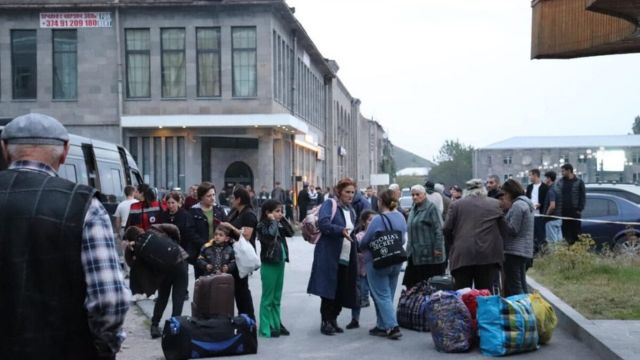The Artsakh Armenians, who were forcibly displaced from their homeland and subsequently suffered from a lack of shelter, food, medicine, and other necessities upon their arrival in Armenia, are currently being subjected to additional unwarranted challenges imposed by the government.
Long-time Armenian citizens of Artsakh are abruptly informed by the Armenian government that, despite possessing passports issued by the Republic of Armenia, they are no longer Armenian citizens.
Numerous Artsakh Armenians have traveled abroad for years without incident on Armenian passports; consequently, the Armenian and international authorities have recognized their passports as authentic Armenian passports. How did Artsakhtsis become Armenian citizens while residing in Artsakh but not thereafter, when they arrived in Armenia?
To further complicate matters, the Armenian government is currently informing Artsakh Armenians that they may petition for Armenian citizenship in the future despite not being Armenian citizens. This is entirely nonsensical.
How does an Armenian citizen reapply to become a citizen? If I reapply for US citizenship as an existing citizen, I will be met with contempt by American government officials who will essentially show me the door.
Treating Artsakh Armenians as noncitizens raises suspicions that the Armenian government, commanded by Prime Minister Nikol Pashinyan, is operating under a covert objective.
He intends to ensure that Artsakh Armenians are unable to participate in future elections in Armenia, knowing that many of them will not support the candidates of his political party, since Pashinyan is the one who ceded Artsakh to Azerbaijan.
Further evidence has surfaced to support the claim that the nation’s leader not only exhibits incompetence but also transgresses domestic legislation for political advantage. The statement issued by the Interior Ministry affirms that individuals holding refugee status are ineligible to participate in national elections, including the right to vote.
The Ministry of Interior of the Republic of Armenia released a statement last week titled “Responses to Frequently Asked Questions by Forcibly Displaced Citizens of the Republic of Artsakh.” Already present within this initial sentence is an inaccuracy. Artsakh Armenians are Armenian citizens, not Azerbaijani or Artsakh citizens.
To convince Artsakh Armenians to embrace their refugee status, the Ministry informed them that refugee status does not impose a mandatory military service obligation in Armenia.

Put differently, Artsakh Armenians, who are Armenian citizens and are obligated to serve in the armed forces, are unjustly granted an exemption from military obligations, which is contrary to the laws of Armenia.
Additionally, the Ministry stated that Artsakh Armenians have no claim to agricultural land as refugees. This provision hinders their capacity to cultivate food on their parcel of land, as they lack the financial resources required to procure food.
Then, the Ministry declared that refugees can’t enter a foreign country. This is also untrue, as Artsakh Armenians carrying Armenian passports are permitted to enter any country with a valid visa, should one be necessary.
Certain nations, including Russia, do not mandate Armenian citizens to obtain a visa. Armenia and other nations have acknowledged the legitimacy of the Armenian passports of thousands of Artsakh Armenians who have already departed the country by simply presenting them.
In contrast, the Ministry subsequently declared that “if a refugee’s passport becomes invalid, it is possible to renew it by providing two photographs along with the expired passport.” Artsakh Armenians who do not possess Armenian passports and are not Armenian citizens are unable to renew their passports in Armenia.
An additional inconsistency arose when the Ministry declared that Artsakh Armenians who obtain Armenian citizenship retain their eligibility to participate in social assistance initiatives designed for refugees.
The sole stipulation is that they must be categorized as “displaced.” Should they maintain their status as citizens of Armenia without compromising their entitlement to receive aid, then why are they categorized as refugees rather than being acknowledged as citizens?
Remarkably, after the transfer of Artsakh and the suppression of Artsakh Armenians’ rights to engage in political activities in Armenia on behalf of Artsakh, the Ministry of Interior asserted that property losses incurred in Artsakh “continue to exist or disappear upon a change in a person’s legal status,” which specifically refers to the acquisition of Armenian citizenship.
It is yet to be seen whether the Armenian government will put its words into action and file lawsuits in international tribunals to defend the Artsakh Armenians’ property rights.
Artsakh Armenians, who hold Armenian citizenship, have endured excessive suffering. They ought not to be subjected to such superfluous bureaucratic folly.
